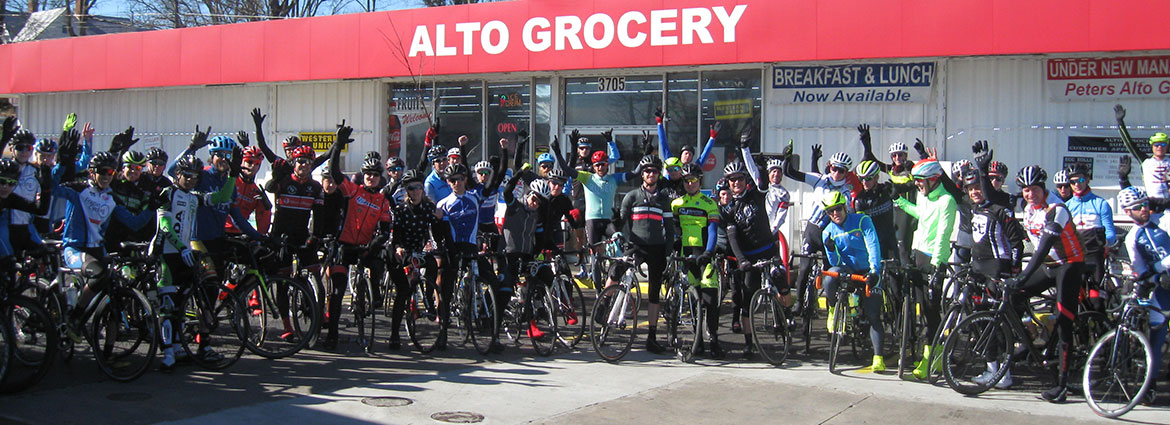The Athens Twilight Criterium
The Athens Twilight
The Athens Twilight Criterium is, by consensus, the fastest one-hour of bicycle racing on this planet. The speed is insane and is a direct result of the course—it’s a 1-kilometer rectangle that riders can whip around without braking, even through the corners. If a rider even feathers the brakes, he’s (she’s) losing ground. The Twilight is an opportunity for a rider to slap his chain onto the big ring, open the throttle, and flat-out haul arse. The insane speed is also a direct result of the racers—these are the adrenaline junkies, the ones with the need for speed, the fastest guys and gals in the world over the course of an hour. These lunatics can lean their bikes, and their bodies, around this 1-kilometer rectangle at precarious angles and ludicrous speeds that defy Sir Isaac’s general principles, and maybe one or two of Moses’s ten tenets. Going this fast must be a sin, but if you think this race is all fun and games, think again.
One sees them before the race—glabrous and glistening, heavily oiled, gliding peacefully on their bikes through the parking lot. They’re wearing a tan fit for a country club patron. They look cool, calm, relaxed, like a veteran trial attorney stepping into the courtroom. But look close—inside they’re falling to pieces, they’re coming undone. If you took their shirts off, you’d see—their brittle torso is white like cotton, the tan’s a façade. They may be smiling now, but Conway and Loretta would say, “its only make believe” because the Twilight averages over 30 miles-per-hour for over one hour; this is no joking matter. Does a condemned man rejoice in the moments before placing his back to the wall and his chest towards the muzzles of a dozen pointing rifles?—it’s absurd to think so. These are disco sprinters (vainglorious fools) that think getting dropped in this race in front of everyone is a fate worse than death. These moments of dread and despair before the race feel like little rats chewing the inside of one’s stomach and in these worrisome moments, many riders realize that they, like Union Army Privateer Henry Fleming, might fling the rifle and head for the hills in a moment of impending catastrophe: Their red badge of courage, a poop stain in their pants.
When a racer is standing at the starting line, he/she (gender neutral throughout) does his best impression of a relaxed rider, but relaxing when thousands are staring laser-guided missiles through you ain’t easy. And, it’s too noisy to concentrate—this inebriated, goodtime, Rabelaisian crowd is cackling like a henhouse full of lusty roosters, making a rider’s heart beat against his chest like a sledgehammer pounding on a thin tin roof. A couple hundred corralled cyclists are bobbing and bouncing like a field full of insanatics, waiting for the gate to fall so they can escape from the asylum. The riders on the front row don’t dare look back—they don’t want the riders behind to see the terror raging in their eyes. Their common fear?—they might be trampled to death.
When the gun finally fires to start the race, a rider sprints to the first corner as if his life depended on it, and it might. It’s the maddest dash of the entire race, so far—the dash to the first turn. If a rider makes it to the turn near the front, he can hit the throttle and floor it out of the corner and accelerate down the road with no obstructions, clear sailing. If he gets to that first corner too late, it’s like a bucket of sand poured into a small funnel—it just takes a little time to get all the grains through. The point: If a racer comes out of the first turn too far back, in the Twilight, the race is over and it’s only ten seconds old: Finis, Finito, Good Night Irene.
In order to survive sixty laps (now 80), the total distance of this race, a rider must get through the first lap unscathed and well placed and not too far back from the front. Generally, only fifty or so will finish because the rear of the field is like the tail of a whip. The unfortunate souls at the wrong end of the line are getting whipped and tossed about like a fly in a tornado. If a rider can’t hold the wheel directly in front—that is, keep his front wheel about six inches from the forward rider’s rear wheel, sometimes while traveling at speeds topping forty miles per hour—his night won’t last long, it is impossible to bridge gaps in this race. If a rider allows a gap to open, he and everyone behind him will be out this race in a matter of seconds, it is a modern day example of Darwinism: To survive one must keep-up with the herd; become separated, and the vultures will soon feast. A racer must focus on the ass-crack in front of him and hold on for his honey’s life.
During the first ten laps, a rider’s pain meter is stuck at the far right end of the red zone. He is feeling the scalding acid of lactic burn in his legs caused by excessive speed as the fastest riders in the world uncork the top-shelf high-octane. The disco sprinters and their teams know in the first ten laps they can cause an explosion in the field as over half the field is dropped, quits or crashes. These skilled assassins, want to dump as many riders as possible now, leaving fewer to contend with later.
In most criteriums, if a rider survives the first ten laps, he knows he will survive until the end. In most criteriums, after the initial frantic, escape from prison free-for-all, there is an ever-so slight decrease in speed, and a small incremental drop in speed can do wonders for a rider’s ability to recover his runaway breath. But the Twilight is not like “most” criteriums. In fact, it’s most unusual: The speed does not drop, it is relentless, it is like trying to play chess while your heart rate is a constant two hundred beats per minute.
But these two-wheeled assassins are also magicians, they’ve been outwitting pain for years. Pain, they know, has no brain, so they trick pain, they confuse pain, they endure pain, like a visit from a mother-in-law, anything to hang in, to finish, and maybe, who knows? And just when they think everything is under control, the race becomes faster: A rider is pedaling a constant thirty-seven miles per hour and is at his limit. He looks up the road and sees a group of four riding away.
If a rider can hang on and hold out for half the race, something happens. The demon of self-doubt is put to sleep and confidence begins its slow drip into the veins. One doesn’t need to see a rider’s face to know, look at the way he handles his bike. A rider with confidence does not ride with his fingers over the brake levers, he’s down in the drops, gripping the bars, he’s sailing through turn one in a perfect arc, coming out of the corner in front of the Georgia Theatre cruising comfortably two inches from the curb, intentionally coming within centimeters of the heads in front of the Georgia Theatre that are stretched out over the barricade--they pull back like a line of Rockettes as he passes.. He’s loose and locked in, he's floating on his pedals, he’s entered the Zen-zone, this is special.
If a rider makes it to the end, there is another factor to consider: Pro teams are expected to win. This is no longer about sportsmanship and fair play, if it ever was. Riders bump and grind and jostle for position, various invectives are hurled, psychological tactics are employed. The best sprinters in the world play a terrifying game of chicken—Back off or bite the curb. Riders may be downing a cold beer together afterwards but at this point in the race, this is a job, this is a paycheck, this is prize money, this is winning. This, brothers and sisters, is living, and the only thing in the world that matters is this moment.
The last two or three laps of this race are spectacular. The big teams are amping-up the speed as high as it can be humanly maintained. The reason: It’s impossible for a rider to move up if he's already pedaling at his limit. The disco sprinter on the team is sitting fourth, fifth, or sixth wheel with two laps to go but out of the last corner has moved to second, third or fourth wheel—these are the spots the winner will come from. The last two hundred meters is simply a stripped-bare example of sheer speed as racers try and tear their bikes apart at the seams as they pull and jerk and twist and pedal in a violent display inner angst. They cross the line, it’s all over, all smiles, that was the greatest race they’ve ever done, they can’t wait to do it again. Have you ever watched film of mountaineers climbing Everest? They’re miserable, some even die. Have you heard them speak of their experiences after they return? They can’t wait to go back. It must be a disease.
David Crowe















